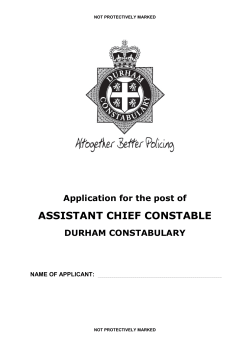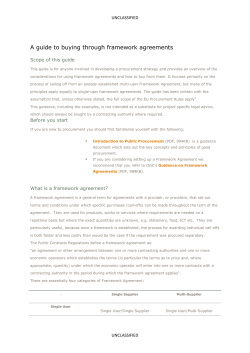
How to do Business with Yorkshire and the Humber Police Forces
How to do Business with Yorkshire and the Humber Police Forces A Guide for Suppliers V1-00 NOT PROTECTIVELY MARKED NOT PROTECTIVELY MARKED CONTENTS Introduction Page 3 Background to Yorkshire and the Humber Region Page 3 Yorkshire and the Humber Regional Procurement Page 4 Procurement Process Page 5 European Legislation Page 6 Internal Procurement Process Page 7 Transparency Page 8 Small to Medium Enterprises, Third Sector and Local Suppliers Page 9 Social Value Page 9 Sustainability Page 10 Contract Management Page 11 Contact Details Page 12 Any queries relating to this document should be referred to:procurement@westyorskhire.pnn.police.uk Page 2 of 11 NOT PROTECTIVELY MARKED NOT PROTECTIVELY MARKED INTRODUCTION The Police service provides numerous commercial opportunities for organisations of all sizes and expertise worldwide. However a lack of information and understanding about the contracting procedures employed by the Police service has been highlighted as reasons why some firms do not apply for Police contracts. With this in mind, the Regional Procurement Team for the Yorkshire and the Humber Police Forces has produced this document to try and help all contractors, consultants and suppliers to tender for contracts let by our Police Forces. It explains how to find out about contracts which have already been advertised, how to apply and what standards are expected if you are awarded a contract. There is, of course, a great deal of competition for police contracts and this guide cannot assure individual firms of success. BACKGROUND TO THE YORKSHIRE AND THE HUMBER REGION The four autonomous Police forces of the region – North Yorkshire, South Yorkshire, West Yorkshire and Humberside – serve a population of over five million people. They serve large urban centers such as Leeds, Bradford, Sheffield, Hull and York, protecting three international airports and the Hull and Humber Ports logistic complexes. Collectively, the forces cover a geographical area of 5,936 square miles, employing 10,975 police officers and 8,007 support staff. The Yorkshire and Humber region is a diverse and varied landscape and home to five thriving urban city centres, although 80% of the region is rural. The region supports many historic market towns, three national parks, undulating moors and an expansive coastline. Such a varied landscape provides a variety of challenges and each of the four forces provide aspects of policing that range from economic and hi-tech crime, to roads policing and community based problem solving within local neighbourhoods. Page 3 of 11 NOT PROTECTIVELY MARKED NOT PROTECTIVELY MARKED The map below outlines the Region and the area each force covers. YORKSHIRE AND THE HUMBER REGIONAL PROCUREMENT The four Police Forces within Yorkshire and the Humber currently spend approximately £200 million per annum on the procurement of Goods, Services and Works. The aim of the Yorkshire and the Humber Procurement Team is to achieve value for money and increase sustainability. We provide specialist support to the forces in the Yorkshire and the Humber region in all tasks related to buying supplies and services using a variety of contractual arrangements ranging from locally placed orders to large complex collaborative contracts. The team employs 38 staff and has dedicated resources for procuring goods, services and works, contract management and strategic projects. Page 4 of 11 NOT PROTECTIVELY MARKED NOT PROTECTIVELY MARKED PROCUREMENT PROCESS Introduction Today's economic climate demands businesses to operate in a sustainable manner with a culture of continuous improvement, taking into account the various different impacts procurement has on the economy and the environment around them. This is no different for the Yorkshire and the Humber Police Forces who are constantly seeking to make the most prudent and effective use of its resources. The Governments’ current drive towards higher efficiency combined with annual constraints on public finance has brought new dimensions to the use of resource management. We are seeking innovative solutions which provide greater value for money. How to find out about contracts which are out to tender. All contracts over the value of £50,000 will be advertised via the Bluelight eTendering Portal www.bluelight.gov.uk. In addition to the Bluelight Portal contracts may also be advertised elsewhere e.g local press or specialist publications. Suppliers are advised to register themselves free of charge at www.bluelight.gov.uk at their earliest opportunity as this will allow them to see all contract activity for UK police forces as well as the fire and ambulance services. Bluelight allows suppliers to register under a specific category relevant to their product or service by using category codes or keywords and once completed suppliers will automatically be notified by email of tender opportunities. This web-based solution enables the whole tender process to be undertaken electronically therefore reducing the vast amount of paper traditionally associated with the process. Other advantages include the ability to publish quotations, prequalification questionnaires and OJEU advertisements as well as providing electronic data storage, archiving and a full audit trail. Page 5 of 11 NOT PROTECTIVELY MARKED NOT PROTECTIVELY MARKED EUROPEAN LEGISLATION European public procurement law affects every public body in the European Union’s Member States. Strict requirements are laid down in respect of the advertising and awarding of contracts across the whole range of services, supplies and works (construction). Current European thresholds applicable from January 2014 can be summarised as:- Supplies Services Works £172,514 £172,514 £4,322,012 Thresholds are updated on the 1st January each year and further information regarding current thresholds can be obtained from:http://www.ojec.com/Threshholds.aspx European Procurement Directives specify timescales that must be followed and these are intended to ensure that reasonable time to respond to adverts and prepare submissions is given to interested parties. N.B. These timescales are correct at date of publish but are subject to change. EU Tendering Process Timescales Procedure Open Restricted Restricted Accelerated Competitive Dialogue Negotiated Receipt of Invitation to Request to tender participate Tender Receipt With ECN Standard 52 Days 45 Days With PIN 36 Days 29 Days 40 Days 37 Days (30 ECN) 36 PIN Contract Notice Receipt of Tenders Minimum Timescales With ETD 40 Days 24 Days (35 Days ETD) (31 Days ETD) Contract Award Contract Award Notice 48 Days 48 Days 15 Days (10 ECN) 10 Days 25 (20) 48 Days 37 Days (30 ECN) Not specified 37 (30) 48 Days 37 Days (30 ECN) Not Specified 37 (30) 48 Days Negotiated 15 Days (10 ECN) Not specified 15 (10) 48 Days Accelerated A 10 day minimum Mandatory Standstill period must be allowed before Contract commencement (Alcatel Period) ECN = Electronic Contract Notice PIN = Prior Information Notice ETD = Electronic Tender Documents Page 6 of 11 NOT PROTECTIVELY MARKED NOT PROTECTIVELY MARKED TRANSPARENCY The Freedom of Information Act came into force on 1st January 2005. With certain exceptions, this Act enables any person who makes a request to a public authority (such as the Police Service) to be informed in writing, whether or not it holds information of the description specified in the request (‘the duty to confirm or deny’) and if it does hold such information, to have that information communicated to him/her (‘the obligations to disclose’). Section 10 of the Act requires a public authority to confirm or deny and if necessary to disclose such information (or to give notice of any ground of exemption) not later than the 20th working day following the receipt of the request. This has since been supported by the publication of the Statutory Instrument 2012 – Amendment 2479 (http://www.legislation.gov.uk/uksi/2012/2479/made), all Police Forces of England and Wales have an obligation to make publicly available a copy of each contract with a value exceeding £10,000 to which (i) the elected local policing body, or (ii) the chief officer of the police force maintained by the body, is or is to be a party. To meet this requirement, the forces of Yorkshire and the Humber (YatH), including Humberside, North Yorkshire, South Yorkshire and West Yorkshire Police, intend to publish all contracts over a value exceeding £10,000 on the Freedom of Information (FOI) page of the Bluelight Procurement Database (www.blpd.gov.uk). If awarded a contract, you will be required to send in a copy of the contract advising us, where necessary of any information that you wish the PCC to consider for redaction prior to publication. Please provide a rationale for requesting the redaction to assist us with the decision. The full list of criteria for which redactions may be permitted as set out as follows: a) Exemptions (absolute or qualified) provided for by the Freedom of Information Act 2000, regarding the disclosure of information; b) Provisions provided for in the Public Contracts Regulations 2006, regarding the disclosure of confidential information; c) Protection of personal privacy as required under the Data Protection Act; d) The protection of Intellectual Property Rights (IPR); e) Third party confidential information e.g. contracts with foster carers and child minders. Information and guidance on understanding exemptions and other FOI matters can be accessed from the Information Commissioner’s Office www.ico.gov.uk. Page 7 of 11 NOT PROTECTIVELY MARKED NOT PROTECTIVELY MARKED SMALL TO MEDIUM ENTERPRISES, SECTOR AND LOCAL SUPPLIERS THIRD We are committed to encouraging smaller, charitable and locally based suppliers as well as social enterprises to compete for business and to support them in improving their ability to meet the Regional Forces’ requirements, whilst complying with the requirements of EU regulations, Standing Orders and best practice guidance. In order to assist these suppliers the Yorkshire and the Humber Regional Procurement Team aim to: Publicise its opportunities in local newspapers and hold ‘Meet the Buyer’ events Provide up to date procurement advice and guidance, including support in completing our tender documentation by holding support sessions for bidders Reduce bureaucracy and keep documentation jargon free. Utilise where possible the division of the contract into smaller lots. Set realistic timescales and deadlines. Encourage suppliers to adopt efficient supply chain management practices. Encourage suppliers to adopt e-commerce systems that streamline processes, reduce administration time and enable the Force to make payment to suppliers in a timely manner. SOCIAL VALUE In accordance with the Public Services (Social Value) Act 2012, the Police and Crime Commissioners of Yorkshire and the Humber have a duty to ensure that they consider how services can improve the social, economic and environmental well-being of the district and consider, then demonstrate, that some degree of social value has been sought and achieved where possible in contracts. More information about Social Value can be found at: http://www.socialenterprise.org.uk/news/new-guide-the-public-services-socialvalue-act Social Value for the communities served by the four Yorkshire and the Humber Police Forces is being defined as: “Outcomes, measures and activity that will create safer, more resilient communities, reduce offending and reoffending and improve the quality of life of local residents.” Page 8 of 11 NOT PROTECTIVELY MARKED NOT PROTECTIVELY MARKED SUSTAINABILITY The Yorkshire and the Humber Police Forces, through their delivery of services to the community can have a significant impact on the local environment and wellbeing of the local communities. The Regional Procurement Team support the Sustainable Procurement Strategy by addressing the wider issue of sustainability where it can influence the type and quantity of resources it consumes and its effect on the local and national economy. Further to this the team will promote good standards of commercial practice by adopting the following methods: • • • • • • • • • • • • Complying with all environmental legislative and regulatory requirements in the procurement of goods and services. Promoting environmental awareness among our suppliers to encourage them to offer us environmentally preferable products/alternatives and services at competitive prices. Early involvement with stakeholders to develop functional specifications supporting suppliers to develop innovative solutions. Specifying and procuring environmentally preferable products for example from recycled and renewable sources where practicable or those that can be reused, recycled or disposed of in an environmentally secure way. Assessing "whole life" costs of a product including its disposal. Identifying options that help conserve energy, water and paper during the manufacturing process and reducing waste. Supporting environmental labelling schemes where appropriate. Observing Waste Packaging Regulations. Monitoring supplier performance in relation to their policies around manufacturing processes, distribution and waste reduction. Publish Key Performance Indicators in relation to environmental progress Promote equality and diversity and aim to contribute to the building of capacity and sustainable development particularly for those communities that may suffer from disadvantage and prejudice. Commit to ensuring that workers employed in its supply chains throughout the world are treated fairly, humanely and equitably in line with the Ethical Sourcing Policy. The Regional Procurement Team recognises that the need for continuous improvement in the area of sustainability is essential and therefore will regularly review its policies and procedures. Where suppliers do not already have a sustainability policy in place, Yorkshire and the Humber Regional Procurement will work together with them to develop something appropriate in line with the scale of that which is being procured. Page 9 of 11 NOT PROTECTIVELY MARKED NOT PROTECTIVELY MARKED CONTRACT MANAGEMENT Contract management may be done at either a local or regional level depending on what is being procured. The four Yorkshire and the Humber Police Forces are continuously striving to improve their own performance and they expect firms working for them to do the same. Therefore, where it is deemed appropriate a Contract Manager will be appointed to monitor a contract. The monitoring system will focus on the key aspects of the contract including performance, quality, price, delivery and sustainability, where appropriate. The contractor may be asked to submit management information throughout the life of the contract and this data will be shared at liaison meetings which will be held at pre-agreed intervals where appropriate records will be kept. Organisations should be aware that some contracts may require members of staff to undertake vetting procedures prior to implementation. Page 10 of 11 NOT PROTECTIVELY MARKED NOT PROTECTIVELY MARKED CONTACT DETAILS Yorkshire and the Humber Regional Procurement Team Unit D, Stephenson Way Wakefield 41 Industrial Estate Wakefield West Yorkshire WF2 OXH Director of Regional Procurement Chris Mottershaw MCIPS 01924 294992 07584 006963 Head of Procurement & Category Management Joanne Osborne MCIPS 01924 294917 07825024718 Strategic Category Managers Ruth McDermott MCIPS – ISD ruth.mcdermott@southyorks.pnn.police.uk 01924 294905 07824083775 Julie Howell MCIPS – Contract Management, Operations, Crime & Corporate Services julie.howell@southyorks.pnn.police.uk 01924 206467 07824083777 Debbie Walker MCIPS – Estates & Transport deborah.walker@southyorks.pnn.police.uk 01609 789680 07824083790 General Enquiries 01924 294914 01924 294918 01924 206460 procurement@westyorkshire.pnn.police.uk Page 11 of 11 NOT PROTECTIVELY MARKED
© Copyright 2025













